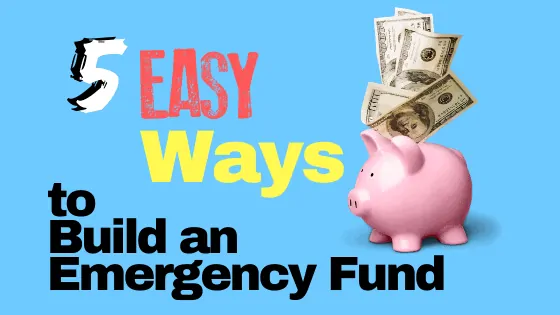 5 Ways to Build an Emergency Fund
5 Ways to Build an Emergency Fund
For most people, the dream is to have a steady flow of income to cover all their needs and perhaps some wants, too. In the real world, however, the unexpected happens – people lose jobs, businesses go down, accidents happen.
You hope those days won’t come but it’s a lot better if you prepare for them. Having an emergency fund ensures that you’ll get through those tough times should they come.
“What If I’m Earning Just Enough?”
You might be asking that question right now, just like many others do. You can’t see how setting aside money can be possible when you feel like you’re living paycheck to paycheck.
Well, know that it can be done.
Here are five ways you can build your emergency fund.
1. Set Aside Money First Before You Spend
Some people fail to build funds because they “intend” to save what would be left of their income after they take care of all their expenses. The problem with this is that it’s easy to get carried away with your spending when you’re out.
You might overspend at the supermarket or make unplanned and unnecessary purchases. What you can do to ensure you save every month is to set a portion of your income aside right after you get your paycheck and before you spend on anything.
You can set a monthly goal – it could be the same amount or you can increase every month. Remember that your savings should be a priority and not an afterthought.
2. Your Big Savings Can Come From Your Small Change
When you get loose change after eating out or shopping, or when you get smaller bills after breaking a $20 or $50, put them in a savings jar.
It might help to think of those smaller denominations as “invisible” and not for spending. As soon as the jar is full, deposit the money to your savings account.
You can also ask your family members to participate. If you have kids, involve them too.
It is always a good idea to teach young ones the importance of saving money for emergencies, too.
3. Review Your Monthly Spending And See Where You Can Make Cuts
If you hardly have any money left at the end of every month, you should create a spending tracker. Write down all your expenses, from your groceries to your bills and every single cup of coffee you buy.
After a month of doing this, review your tracker and find where you can make adjustments.
For instance, if you’re spending too much on dining at restaurants or ordering takeouts, you can try cooking at home and meal prepping so you can avoid eating out.
If gas takes a chunk of your income, check with your colleagues if you can carpool with some of them to save money.
Sometimes the smallest changes you make in your lifestyle have a significant effect on your finances.
4. Don’t Spend Your Windfalls
If you receive unexpected moolah every once in a while, don’t be in a rush to buy that nice pair of shoes you saw last time, even if they’re on sale. Whether it’s just $10 from your grandma that you get for your birthday or payment from a friend who owed you money in college, keep it in your savings account immediately so you won’t be tempted.
If you get a gift card, spend it on necessities so you won’t have to spend your income on those and add the saved amount to your emergency fund instead.
Money from bonuses and commissions are not part of your regular budget, too, so they won’t be missed even if you deposit the entire amount to your savings account.
This might mean that you’re passing up on some luxuries and fun outings but you can always have that later when you already have the peace of mind knowing you already have your emergency fund.
5. Find Additional Sources of Money
Do you still have time and energy to spare after working? Why not get a second job?
You can work part-time or find some freelance work.
If you have a hobby, why not make money from that? For example, if you can cook really well, you can start a small food business like preparing healthy lunch for your friends and colleagues.
Or if you’re crafty, you can sell some of your finished products on Etsy or other online platforms. You can also hold garage sales a few times a year to earn money from clothes and other stuff that you don’t use anymore.
When you have extra income, you can decide if you’ll put all your earnings from that to your emergency fund or just a part of it.
It might be a better idea to save all the money from your side hustle until you have reached your targeted amount for your fund.
How Much Should You Save For Emergencies?
While it depends on your financial situation, the ideal amount would be what’s enough to get you covered for at least six months in case you lose your source of income.
Calculate your monthly living expenses, including bills, food, and all your necessities. Multiply that by six and you’ve got your number.
Of course, if you can save an amount that can cover a year or more’s worth of expenses, that would be even better.
Always Remind Yourself What Constitutes an Emergency
When you have enough on your savings account, you might get tempted to withdraw some for your birthday, the holidays, or a really good deal online.
You have to remember that the money is for emergencies and that those are not considered an emergency. Remind yourself that you have that money in stash because you don’t want to find yourself in an unexpected situation and have nothing to live on.
Be serious about your plan to build an emergency fund but do not pressure yourself to start big immediately. Your fund will grow as long as you regularly top it up.
The important thing is that you start now so you won’t be sorry later.
What are some tips you have to build an Emergency Fund?







